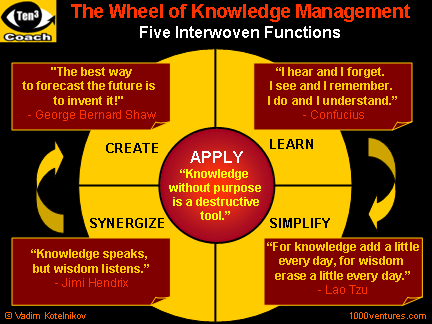
→
Work
Smart and Hard
|
|
Knowledge
Defined
→
Knowledge
is a set of
understandings used by
people to
gain insights, work smarter,
generate new ideas,
→
make decisions,
→
take actions that are important to the company
and
gain new knowledge.
As opposed to 'information', knowledge is defined by
its use and its relevance to
→
value creation.
Knowledge and
its management should be integrated into all building
blocks of how your
→
organization
achieves its
vision, creates
→
corporate capabilities.
manages creativity,
ideas and
→
innovation.
Knowledge as the Source of Business Value
"What enables the wise sovereign and the
good general to strike and conquer,
and achieve things beyond the reach of
ordinary men, is foreknowledge."
~
Sun Tzu, 'The
Art of War'
In the
→
new economy, the knowledge component of products and
services has increased dramatically in importance and has become the dominant
component of
→
customer value. The shift to knowledge as the primary source of
value, makes the new economy
→
led by the companies who
manage knowledge effectively – who create find, and combine knowledge into
new products and services
faster than their competitors.
"Knowledge includes all the valuable concepts and vital know-how
that shape a business to be wanted and needed by customers. Companies that are
fast to market and demonstrated an ability
to move with speed and sustain speed view
time and knowledge as assets that are real money in the bank."4...
More
The Power of Your
Cross-Functional Excellence
If you build broad cross-functional expertise,
no idea will be wasted! Your
mind can accept only those ideas that
have a frame of reference with your existing
knowledge
and
comprehension. It rejects
everything else. If your knowledge is functionally focused, you'll be open
to new ideas related to your functional expertise only and will miss all
other
→
learning and
→
innovation
opportunities.
|
|
If you develop a broad
cross-functional expertise, no new idea will be wasted. It will immediately
connect with the existing knowledge and will inspire you, energize you,
and encourage your
serendipity and
→
entrepreneurial creativity
.
The broader your net is, the more fish you catch...
More
Explicit and Tacit Knowledge
All knowledge isn't the same. There is explicit knowledge
– the
kind that can be easily written down (for example,
patents, formulas, or an
engineering schematic). The explicit knowledge can create
→
Competitive Advantage
,
but its half-life is increasingly brief, as it can be replicated easily by
others.
Tacit knowledge, or implicit knowledge, is far less tangible and
is deeply embedded into an organization's operating practices and
→
culture
. "Tacit knowledge includes relationships, norms,
values, and standard operating procedures. Because tacit knowledge is much
harder to detail, copy, and distribute, it can be a sustainable
source of
competitive advantage.
What increasingly differentiates
→
success
and
failure is how well you locate, leverage, and blend available explicit
knowledge with internally generated tacit knowledge."3
Inaccessible from explicit expositions, tacit
knowledge is protected from competitors unless key individuals are hired away.
Tacit Knowledge as a
Sources of Competitive Advantage
One source of
→
Sustainable
Competitive Advantage
is
to diffuse throughout your company the unique, proprietary knowledge about
→
Value Creation,
→
Customers
,
→
Competitors,
→
Product Development, and
advanced ideation techniques that resides in the minds of
your employees...
More |